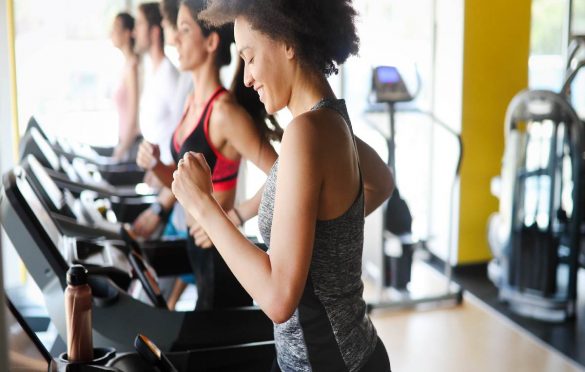7 Ways Regular Exercise Can Help Your Anxiety

Anxiety is an emotion that results from the way the brain reacts to specific triggers to notify an individual about a potential danger. Every person goes through a series of anxious thoughts whenever they worry about work-related situations, take a life-changing test, or make an important decision.
While these occasional triggers are typical, some disorders may cause overwhelming and constant fear that often makes the victim want to avoid school, work, and social gatherings with relatives.
In addition, an individual with an anxiety disorder experiences symptoms like sleep issues, shortness of breath, uneasiness, tingling hands, dry mouth, nausea, and repetitively thinking about a problem.
Without proper support from expert medical professionals, this condition can significantly affect the ability of the person to concentrate. Fortunately, staying physically active can reduce a person’s anxiety, improving productivity at work while strengthening their relationships with family and friends.
This article provides you with the seven benefits of regular exercise in relieving anxiety.
Table of Contents
Promoting Sharper Memory And Thinking

Engaging in daily physical activities can instantly boost a person’s memory and thinking skills by allowing them to remember vital information related to their day-to-day activities. For example, when an individual goes to the grocery store to purchase their weekly essential items, being able to remember specific products will help them finish the task immediately.
Maintaining and improving your memory is an important part of your overall health. For instance, even if an adult doesn’t have to memorize vital details for written exams, the ability to remember information accurately is critical.
With a sharp memory, the mind stays active, establishing the connection between the brain cells and keeping an individual mentally strong. Due to the high metabolic demand of exercise, this activity can improve blood circulation to the brain by feeding this internal body part with sufficient nutrients.
As a result, this continuous blood flow encourages the brain to properly do its job, which helps an individual in carrying out their daily tasks. In addition, this process can increase molecule production, which is essential for the brain to function, including memory and thinking.
Furthermore, a significant stress hormone reduction takes place in the brain, which decreases the impact of the stressful experience you’re trying to forget. You can read more online about how you can use exercises to sharpen your mind and reflect on challenges while reducing your anxiety.
Improving Self-Confidence
Another benefit of regular physical exercise includes pumped-up endorphins, which are valuable in reducing stress. Whenever a person goes through these activities, their bodies release feel-good endorphins. These are organic brain chemicals that can improve your sense of well-being.
Meanwhile, individuals who suffer from high social anxiety disorder are more likely to associate negative words with themselves than those who don’t go through this condition. This makes sense because this approach causes anxious people to feel limited by doubting themselves and their abilities to accomplish their purpose.
In addition, the intense feeling of limitation reduces their self-esteem since they’re less sure of their ability to handle particular situations calmly. Nevertheless, engaging in physical exercise will instantly take the mind off worries. It’ll prevent them from going through repetitive negative self-talk resulting from anxiety and depression, which builds up a stronger sense of self-esteem.
The payoff of regularly working out rewards a person with a strong sense of accomplishment. Whether they beat a slower time in a hundred-meter dash or boost time to a daily walk, these activities will give them a sense of pride in achieving a particular goal.
And as they continue to reach new milestones in their training initiatives, they’ll also gain another purpose that gives them something to look forward to in the morning and helps them in getting rid of oversleeping.
Promoting Better Sleep
Having enough sleep is essential to a person’s physical and mental stability. Hence, you need to alleviate sleep-related issues and have plenty of rest with proper exercise. Since moderate to strenuous exercises take strength, these activities can instantly make you feel exhausted after moving your muscles and boosting blood circulation.
Significantly, people naturally need sufficient sleep to maintain physical and mental strength. In addition to mood and anxiety disorders, those with insomnia are at risk for heart failure, high blood pressure, obesity, and diabetes, as these people stay up late at night worrying about their issues.
Due to sleep deprivation, the individual may have trouble concentrating. This makes them tired throughout the day and increases their risk of car accidents and injuries. On the other hand, exhaustion from doing physical exercises can cause an individual to fall asleep, instantly boosting their mood in the morning.
Increasing Social Interaction
Social interaction is essential for the well-being of a person because establishing and nurturing relationships with loved ones is vital to the soul. With a significant boost in self-esteem, daily exercise can urge an individual to socialize with their friends and relatives.
In addition to reconnecting with their existing social circle, they’ll also discover new opportunities to initiate conversations with the community whenever they participate in physical-related competitions. As they meet these people, they become engaged in socializing with these groups, which lessens their time engaging in negative self-talk.
On the other hand, spending too much time on your own can make you feel lonely and out of touch, which makes you believe that people are against you. When you have negative thoughts, you may unintentionally hurt your relationships with friends and family, which can make you feel unstable.
Enabling Healthier Coping Mechanisms
People can become more confident within themselves by regularly engaging in physical activities. As a result, they motivate themselves to have healthier coping mechanisms. They may also engage in other activities like reading, meditating, stretching, going to the movies, listening to feel-good music, socializing with friends, and engaging in a hobby they enjoy.
Meanwhile, people with anxiety disorders often engage with harmful coping mechanisms, such as excessive alcohol consumption or dwelling on how they feel. In addition, trying to make these negative thoughts and repetitive negative self-talk go away can be challenging. They might physically and mentally hurt themselves, which can worsen their current conditions.
For example, when a person is stressed about a specific issue, they might decide to run away from the city by driving fast in a car, which may lead to a deadly road accident and other legal repercussions.
On the other hand, the positive coping mechanisms that regular exercise provides can include addressing the immediate source of the problem, looking for the good amidst the bad, or turning the issues into an avenue to grow spiritually as an individual.
Allowing Effective Mindfulness
To practice mindful fitness, you need to find flow by giving each workout a purpose. This can include finishing your planned goals, strengthening specific muscles, or challenging yourself. While exercising, you also have to pay continuous attention to your movement by noticing the repetitive strike of your foot while running or focusing on every muscle during strength training.
Essentially, mindfulness can teach anxious people to handle their difficult emotions better. And this should be done without suppressing, overanalyzing, or encouraging these emotions in order to keep them from becoming exaggerated.
Furthermore, mindfulness also eases anxiety by allowing an individual to turn inward to keep their mind quiet and still while concentrating their attention on the present moment instead of dwelling on past mistakes or future fears.
As a result, practicing this activity will help them build self-control, which urges them to clear their heads before committing a potentially destructive action that may become a more significant issue.
Meanwhile, to practice mindfulness, you can put on your favorite playlist while moving your body to prevent you from overthinking specific problems. Also, this strategy enables your mind to roam freely as your body moves during the exercise. Moreover, meditation will help you gain a more substantial commitment to exercise by allowing you to stay present.
Boosting Spiritual Development
One healthy coping mechanism to alleviate stress and reduce anxiety is looking at the physical workout as a spiritual experience. More important than the biological outcomes of engaging in physical activities, people who go through stress need to consider practical ways to elevate spirituality and sense of being.
Significantly, developing one’s spirituality encourages people to have better connections with themselves and others, which forces them to become better individuals. In addition to effective relationship building, this factor helps you deal with stress by providing a sense of purpose, peace, and forgiveness.
As a result, you become less challenging of your previous self and mistakes while being peaceful about past situations instead of dwelling on them repeatedly.
Key Takeaway
Anxiety can affect how a person deals with their issues and the people surrounding them. With that, you should consider engaging in regular exercises to help relieve the pressure with these seven benefits. As a result, you can be better during decision-making and reduce your self-talk to nurture your mental, emotional, physical, and social well-being, improving your overall life.


